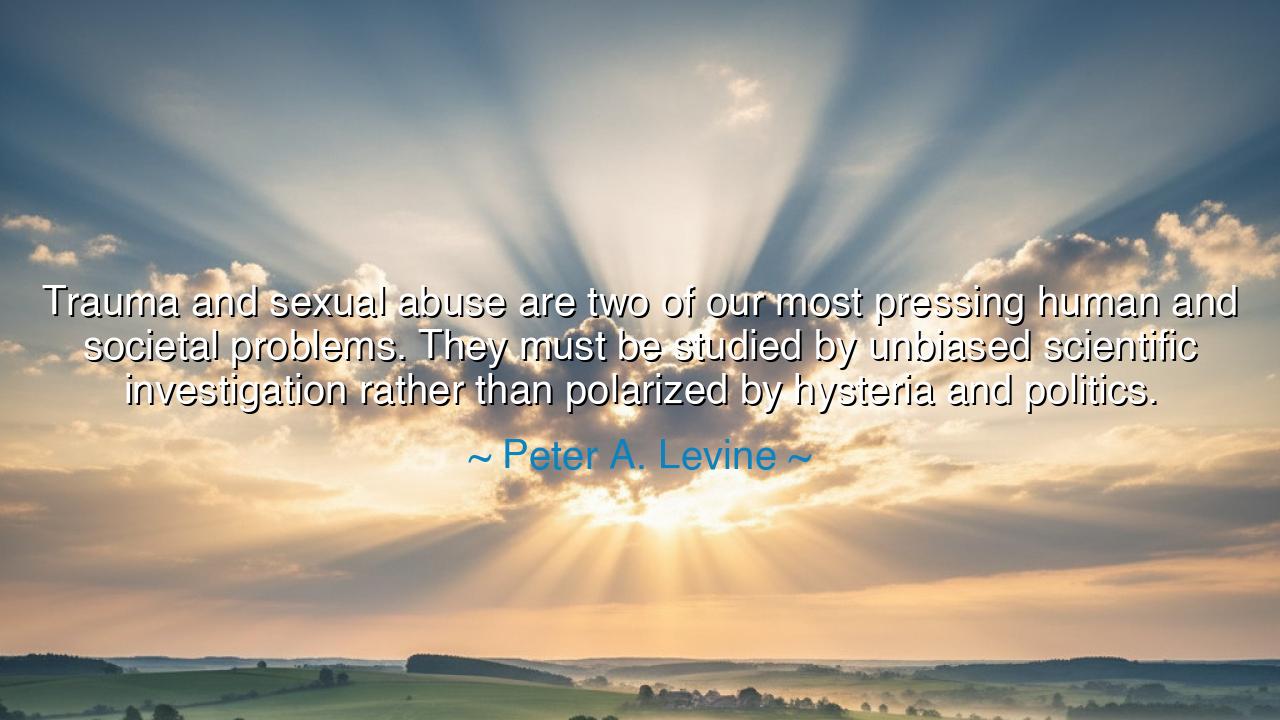
Trauma and sexual abuse are two of our most pressing human and
Trauma and sexual abuse are two of our most pressing human and societal problems. They must be studied by unbiased scientific investigation rather than polarized by hysteria and politics.






The words of Peter A. Levine — “Trauma and sexual abuse are two of our most pressing human and societal problems. They must be studied by unbiased scientific investigation rather than polarized by hysteria and politics.” — strike with the weight of sorrow and clarity. He speaks of wounds not carved upon the flesh alone, but upon the soul — wounds of trauma and sexual abuse, which ripple through families, communities, and generations. These are not matters to be buried in shame or twisted by ideology, but to be faced with honesty, care, and the steady light of truth.
The meaning of his words is both compassionate and urgent. When hysteria rules, suffering is either sensationalized or denied, and when politics takes hold, truth is bent to serve power rather than healing. Levine insists that such sacred matters must be entrusted to unbiased scientific investigation, where evidence, not prejudice, guides understanding. Only then can true remedies be found, and only then can the cycle of silence and distortion be broken.
History offers us tragic examples of what happens when this wisdom is ignored. In the twentieth century, countless survivors of sexual abuse within institutions — schools, churches, and families — were silenced because leaders feared scandal more than justice. Their pain was politicized, dismissed, or hidden. It was only when investigative courage and scientific study began to shed light on the long-term effects of trauma that society started to grasp its magnitude. In this we see Levine’s point: truth and healing arise not from noise or power struggles, but from the courage to face reality with clear eyes.
The origin of Levine’s insight lies in his life’s work as a pioneer in trauma therapy. He saw how trauma lodges itself in the body and mind, shaping lives long after the wound is inflicted. His plea is not only for scientific rigor but for human dignity — that victims be heard, believed, and studied not as curiosities of scandal but as bearers of truth who can guide humanity toward healing.
Therefore, O children of tomorrow, hold fast to this teaching: when you face the deepest wounds of humanity, approach them with reverence, clarity, and courage. Do not allow hysteria to cloud compassion, nor politics to twist justice. For in the careful study of pain lies the path to its release, and in the honest naming of wounds lies the seed of healing. As Levine reminds us, only by uniting science with compassion can we break the chains of trauma and build a future where such suffering no longer festers in silence.






NTThi Nhung Tran
This quote speaks to the heart of a very real problem. Trauma and sexual abuse are not just personal issues—they affect our society at large. But how do we prevent the conversation from being hijacked by hysteria or political agendas? Is it possible for the scientific community to lead the way in addressing these issues without fear of backlash? How can we ensure that victims' voices remain central to the conversation while keeping the discussion grounded in research?
NHNguyen Hai
Peter A. Levine brings up a critical point about the need for unbiased scientific investigation when it comes to trauma and sexual abuse. These are deeply personal and societal issues, but they are often clouded by extreme reactions and political agendas. How can we shift the conversation to be more focused on healing and understanding rather than partisan arguments? What role do mental health professionals play in helping remove the stigma from these discussions?
GDGold D.dragon
I completely agree with Peter A. Levine’s sentiment about the importance of studying trauma and sexual abuse in an unbiased, scientific way. These are not issues that should be used for political gain or as part of a moral panic. How can we ensure that research is conducted with integrity and that the needs of victims are genuinely addressed, without reducing them to political talking points? Can such a delicate issue ever truly be free from politics?
TNLe trong nghia
This quote makes me think about how deeply trauma and sexual abuse impact individuals and society as a whole. Yet, it seems like these issues are too often discussed in extremes, either in a highly emotional way or through a political lens. Is it possible for us to have a meaningful, evidence-based conversation about trauma and sexual abuse without the interference of hysteria or politics? How can we achieve that balance?
SRsonic raxing
Peter A. Levine's statement about trauma and sexual abuse being two of our most pressing societal problems really strikes a chord. It’s concerning how often these topics are politicized or reduced to hysteria, rather than approached with a clear, unbiased mindset. How can we ensure that scientific research into these issues is done without bias or political influence? Shouldn't we be prioritizing the well-being of victims over ideological debates?